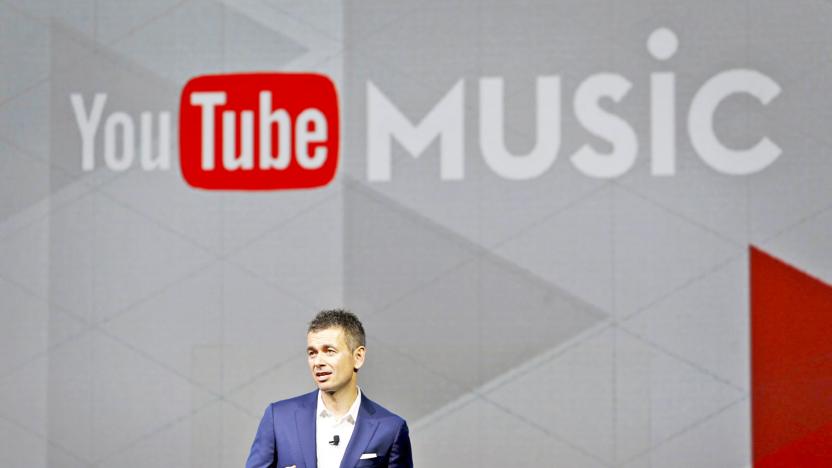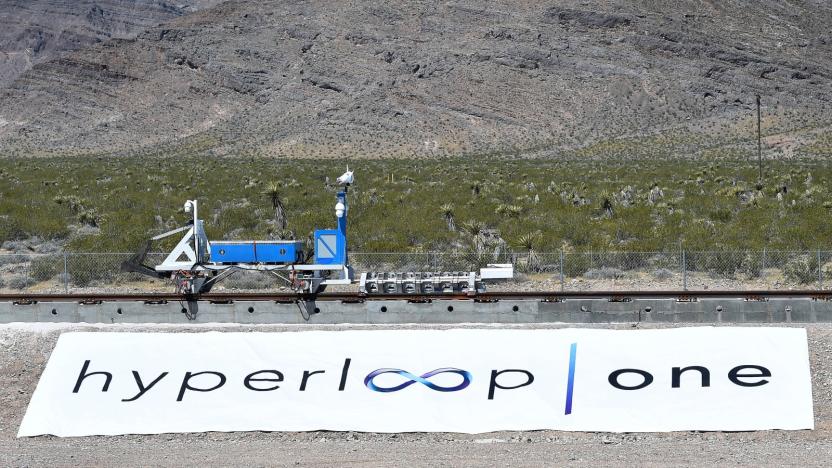safeharbor
Latest

Music labels sue Cox again for allegedly ignoring piracy
Music labels really, really aren't a fan of Cox's internet service. Sony, Universal and Warner Bros. have sued Cox again for contributing to copyright infringement after it allegedly refused to take "reasonable measures" to fight piracy. While internet providers are supposed to terminate the accounts of users who ignore warnings against bootlegging music, Cox only ever conducted "soft terminations" (temporary disconnections) and warned some users over 100 times. It even instituted a cap on the volume of accepted copyright complaints and cut back on the number of anti-piracy staffers, according to the labels.

EU agrees to data deal with Japan as US pact hangs in the balance
The EU and Japan have reached an agreement that will allow businesses in both regions to freely share and transfer data without additional safeguards or authorizations. The deal, which covers information such as credit card details and browsing habits, will help to fortify links between the EU and Japan, which recently signed the world's largest free-trade agreement.

Judge sides with Airbnb in lawsuit from US apartment landlord
Airbnb may have just dodged a bullet. A Los Angeles federal judge has ruled against major American landlord Apartment Investment & Management Co (AIMCO) in its lawsuit accusing Airbnb of helping tenants violate their lease agreements through unapproved short-term rentals. The judge determined that Airbnb was protected by the Communications Decency Act, which protects internet services against liability for the content posted by their users. It's the tenants that are responsible for the rule-breaking listings, the court said, not Airbnb for hosting them.

Internet giants now support bill to curb online sex trafficking
For ages, internet companies have fought changes to the Communications Decency Act's Section 230, which protects them from liability for content that might pass through their websites. They don't want to be sued because someone conducted sex trafficking on their sites without their knowledge. They've had a change of heart, though. The Internet Association (which includes Amazon, Facebook and Google) now supports the proposed Stop Enabling Sex Traffickers Act, which would explicitly punish online sites that facilitate exploitation, after lawmakers altered the bill to protect innocent sites against criminal charges and lawsuits.

YouTube and Warner extend their streaming music deal
YouTube's relationships with music labels have certainly been fraught, but it just managed to reach a truce with one of them... at least, for now. The streaming service and Warner have extended licensing deals that will make sure Warner and its artists get paid for legal streams. The terms of the deal haven't been revealed, but a memo from Warner chief Steve Cooper suggests the label is being particularly cautious this time around. The deals are "shorter than usual," he says, "giving us more options in the future." And there's no mistaking why Warner is reluctant to commit for the long haul -- Cooper is convinced that YouTube is taking a lackadaisical approach to fighting piracy.

Trump signs executive order stripping non-citizens of privacy rights (updated)
With a stroke of his pen, the president just potentially invalidated a transcontinental data flow agreement between the US and EU which took years to negotiate.

Recommended Reading: What happened at Hyperloop One?
How Hyperloop One went off the rails Sarah McBride, Bloomberg The folks at Hyperloop One are one group trying to make Elon Musk's seemingly crazy idea of a levitating pod transportation system a reality. That task hasn't been without its fair share of issues, including infighting and employee lawsuits. What the heck happened? Well, Bloomberg takes a look at the company's inner workings to provide some context for the recent headlines.

The EU-US Privacy Shield is up, but its future is in doubt
After much argument and discussion, the European Commission (EC) today adopted the Privacy Shield, an EU-US agreement that's supposed to protect the rights of Europeans whose personal data is transferred to the US. It's necessary because laws in the US aren't on par with Europe when it comes to data protection. With the agreement in place, companies like Facebook and Twitter can now freely move information between regions while ensuring that Europeans' rights are upheld.

Music industry pushes for digital copyright law reform
Think the Digital Millennium Copyright Act is broken, leading to all kinds of abuse? So does the American music industry... just not for the same reasons. The RIAA and other groups have responded to a US Copyright Office request for comment on the DMCA by calling for broad reforms of the "harmful" and "obsolete" law. They argue that the takedown notice approach doesn't work well given the sheer glut of pirated material -- all it takes is a slightly different web address to make that bootleg song available once again. They also claim that safe harbor provisions are too kind, letting some sites profit from piracy that they know is taking place.

US and Europe reveal how they'll protect your personal data
The US and EU have published a big pile of documents that spill the beans on the pair's replacement for Safe Harbor. The new provision is known as the EU-US Privacy Shield and is designed to limit how much personal data the NSA (amongst others) can access. The files also call for the creation of an independent regulator that'll handle complaints from users which will be funded by contributions from internet companies. The most interesting factoid we've spotted so far is that firms like Facebook can choose if it wants to be subject to American or European data protection law -- although it'll default to the former.

France tells Facebook to stop moving user data overseas
France's privacy regulator has told Facebook that the site is in violation of the country's data protection act. Furthermore, the social network has been given just three months to get its act together, or it'll face the threat of sanctions. The charges leveled against the site include the fact that it pushes data relating to its European users to servers based in the US. That's been a bone of contention across the continent, which is why the provisions governing such actions -- Safe Harbor -- were declared invalid last year. That means that Facebook's been sending your private messages to servers accessible by the NSA without any permission.

EU rules that US companies can't freely pull data out of Europe
A legal framework used to justify the movement of user data across the Atlantic has just been ruled invalid by the European Court of Justice (ECJ). The Safe Harbor agreement, as it's known, let companies like Facebook and Twitter freely move your information between its centers in Europe and the US. However, following today's judgement, they may now need to store those details locally or prove that European privacy standards designed to protect your rights are being upheld.

Europe wants to keep its citizens personal data out of the US
Over the pond, there's a rule preventing companies from moving a user's personal data outside of Europe unless the receiving country has adequate data protection laws. In practice, this means that a company like Twitter can push stored information on a British user to a server in San Francisco, and vice-versa, and plenty of it happens on a regular basis. Now, however, one of the continent's highest legal minds wants to put a stop to it, or at least make sure that it's better regulated. Yves Bot is an Advocate General to the European Court of Justice, and has written a paper saying that America's cavalier attitude to data is dangerous, and should be stopped.

Brazil passes an internet bill of rights enshrining net neutrality and privacy
While the world has been deciding who governs the internet, Brazil has been busy establishing internet rules of its own -- and they may just set an example for everyone else. The country has passed a bill of rights that goes some length towards protecting net neutrality and privacy. To start, the law promises equal access to the internet; carriers can't charge more for bandwidth-heavy services like streaming video.

Microsoft's Patriot Act admission has the EU up in arms
Last week, Microsoft quietly confirmed that cloud data stored on its European servers can still be handed over to American investigators -- and the EU is none too pleased about it. As it turns out, the revelation has shed new light on a fundamental conflict between US law and the EU's Data Protection Directive -- an edict requiring that companies notify consumers whenever sharing their personal information. The bi-lateral Safe Harbor agreement calls for similarly strict protocol, but under the Patriot Act (which trumps all else), companies like Microsoft could be forced to hand over private data without informing targeted individuals. In response, some members of the European Parliament are calling upon legislators to take action and to implement safeguards that can't be overridden by third-party governments. It remains to be seen whether or not this leads to any new laws or transatlantic tensions, but if we've learned anything, it's that Europeans take their clouds very seriously.

Italy rules YouTube and other video sites are like TV stations, are liable for content
Strange policy changes are afoot in Italy, where the government's Communications Authority has just issued two resolutions that effectively turn YouTube and other video services into TV stations subject to stricter regulation -- and stricter liability for the content they host. Under the new rules, any site that exercises even the smallest amount of editorial control over its content will be considered an "audiovisual service," and have to pay additional taxes, take down videos within 48 hours if anyone complains of slander, and -- most oddly of all -- somehow refrain from broadcasting videos "unsuitable for children" at certain times of the day. (No, we have no idea how that works with an online video site.) Making matters worse, the new rules give creedence to the notion that video service providers are somehow directly responsible for what their users post to the site -- even if the only "editorial control" they exercise is automated and not overseen by actual humans. We'd expect it the new rules to be challenged in Italian court sometime soon, since they effectively make it impossible to run an online video service in the country, and seem to be in opposition to EU rules that protect internet service providers -- and we'll see if YouTube remains available to Italian IP addresses for very much longer. Oh, and if you're worried this sort of insanity will cross over to the US, you should chillax -- the laws you love to hate are on your side. Section 230 of the Communications Decency Act and Section 512 of the DMCA provide "safe harbor" to internet service providers, making it extremely hard to go after them for the actions of their users. You might remember Section 512, actually -- it played a starring role in knocking down Viacom's lawsuit against Google and YouTube back in June. You, the DMCA and the CDA, all hanging out and watching YouTube together -- sounds like a lovely afternoon, doesn't it? [Thanks, Matthew]

Google executives found guilty of violating privacy of student bullied on video
Hold tight kids, internet privacy laws just got flipped upside down. An Italian judge found three Google executives guilty of violating the privacy of an Italian student who was bullied in a 2006 video posted on Google Video. The video resided on the site for two months before it was brought to Google's attention and pulled. None of the executives were involved in any way in the making of the abhorrent video. Nevertheless, Italian judge Oscar Magi sentenced the execs to a six-month prison sentence but cleared them of defamation charges. No jail time is expected, however, since any sentence of less than 3 years is typically commuted in Italy for those without a criminal record. As you can imagine, Google has responded with vigor. In a post on Google's official blog ominously titled "Serious Threat to the Web in Italy," Google calls the decision "astonishing" citing the assistance it provided to local police in helping bring those who uploaded the video (and bullied the autistic child) to justice. More importantly, Google says that the decision "attacks the very principles of freedom on which the Internet is built." On the surface, we have to agree. Here's how Google describes the dystopian knock-on effect should this ruling take precedent: "European Union law was drafted specifically to give hosting providers a safe harbor from liability so long as they remove illegal content once they are notified of its existence. The belief, rightly in our opinion, was that a notice and take down regime of this kind would help creativity flourish and support free speech while protecting personal privacy. If that principle is swept aside and sites like Blogger, YouTube and indeed every social network and any community bulletin board, are held responsible for vetting every single piece of content that is uploaded to them - every piece of text, every photo, every file, every video - then the Web as we know it will cease to exist, and many of the economic, social, political and technological benefits it brings could disappear." Google will, of course, appeal.







